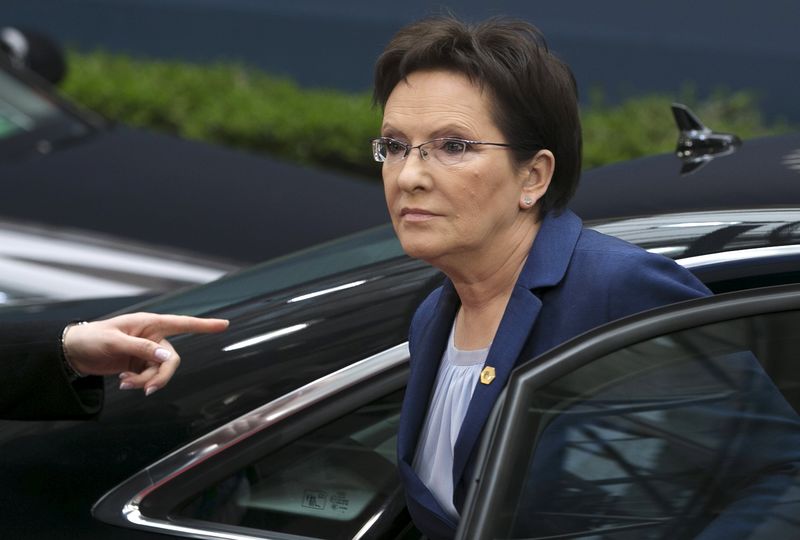By Pawel Sobczak and Wiktor Szary
WARSAW (Reuters) - Poland's center government will put major economic reforms on hold until after a parliamentary election at the end of the year, focusing instead on voter-friendly social and welfare issues, sources told Reuters.
Despite an improving economy, opinion polls suggest the Civic Platform party of Prime Minister Ewa Kopacz may have a reduced majority after the election and will have to rely on the support of parties resistant to reform.
Three senior government and ruling party sources, who spoke on condition of anonymity, said Kopacz was not planning major policy announcements before polling day, meaning attempts at reforming the ailing coal industry and inefficient healthcare system will be postponed.
Poland's economy has grown by nearly a quarter since 2007, the most robust growth in the EU, pushing the number of people in work to the highest since the transition to capitalism in 1989, with over 16 million people in employment.
But many economists say factors that have driven growth, including EU aid money and low wages, will come to an end in the next few years and Poland must cut state spending on welfare and liberalize uncompetitive sectors of the economy if it is to tap into new sources of growth and keep a lid on the budget deficit, expected to have stood in 2014 at 3.2 percent of the gross domestic product (GDP).
"We're counting on the economic improvement, particularly the fall in youth unemployment (and) the increase in the number of jobs to help us in the election," said a senior source in Kopacz's party.
AVOID CONFLICT
A senior government source said of the election campaign: "We will want to emphasize social issues, to do with welfare.
"The government will try to avoid open conflict with large social groups, like the one with miners in January."
The government, faced with strikes, had to scale back a cost-cutting plan for struggling state-owned miner JSW and agree to unions' demands the chief executive be removed.
Kopacz's chief economic adviser Janusz Lewandowski has described the agreement with trade unions as "shallow and incomplete" but said far-reaching reform would have caused unrest in the mining heartland of Silesia, an important source of votes for the governing party.
A source close to Kopacz said the government planned to introduce paid parental leave for farmers, students and the unemployed, a move with an estimated annual cost of 1.2 billion zlotys ($314 million), and pass a bill regulating in vitro fertilization (IVF) treatment.
The Civic Platform's main rival is the socially conservative but economically left-leaning Law and Justice (PiS) party, whose politicians are staunch opponents of the IVF bill which they say goes against the Catholic Church's teaching.
Civic Platform-backed incumbent Bronislaw Komorowski has slipped in opinion polls ahead of May's presidential election.
"The presidential election, which now looks more difficult (for Komorowski) ... will also discourage the government from taking braver steps," said political analyst Aleksander Smolar.
No date has yet been set for the parliamentary election.
